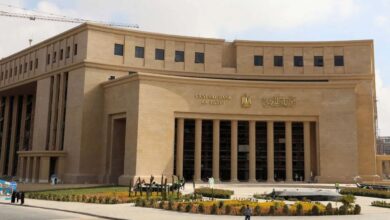After declining sharply since mid-July, the Egyptian pound fell to 5.69 against the US dollar on Wednesday, representing its lowest level in three years. Local economists, meanwhile, say the pound's depreciation vis-a-vis the greenback promised to negatively affect the local economy.
“Egypt mainly depends on dollars to import goods,” said Ehab al-Desouki, economy professor at Cairo's Al-Sadat Academy. "Therefore, a stronger dollar means a bigger import bill."
Egypt's chief imports consist of machinery and equipment, foodstuffs, wheat and fuel. The United States, Russia, China and Italy represent Egypt’s main trade partners for import.
“If prices for imported items go up, prices for local products will rise as well," al-Desouki explained. "Consequently, Egypt's balance of payments will run up huge deficits.” This, he noted, would serve to push up inflation, “under which Egypt's economy had long been suffering already.”
Al-Desouki went on to point out that the Central Bank of Egypt (CBE), in an effort to maintain market equilibrium, would likely intervene in the currency exchange rate market. “The CBE will dip into Egypt’s foreign exchange reserves in order to pump more dollars into the local market once the Egyptian pound bottoms out,” he said.
According to Al-Masry Al-Youm economic consultant Mesbah Kotb, the effects of the global economic crisis have yet to impact Egypt, which can expect to face serious domestic financial problems in the near- to mid-term future.
“Egypt's foreign-exchange market is related to FDI (foreign direct investment), which has fallen sharply since the onset of the global crisis,” he explained. Accordingly, he added, capital inflows had decreased, leading to a stronger US dollar against the local currency.
Kotb added that international money transfers to Egypt from abroad had also decreased within the last two years, along with revenue from the Suez Canal–Egypt's third chief source of foreign currency–which has recently fallen by almost 25 percent.
“All these circumstances seriously affect economic growth, especially in light of the fact that the saving rate in Egypt stands at only 17 percent," he noted. "This is quite low in comparison to other developing countries."
According to World Bank statistics, 40 percent of Egypt’s population already lives under the poverty line (set at US$1 per day per capita).
Nevertheless, Kotb ruled out the possibility of the reappearance of a black market for dollars–a phenomenon that had dogged the local market in the first half of this decade–pointing out that, since 2004, the CBE had been keeping close tabs on exchange-rate stability and maintaining inter-bank coordination.
Economic analyst Abdel Rahim Hashem, former deputy director of the government's Central Accounting Agency, attributed Egypt's long-term fiscal imbalances to a number of factors.
“Egypt imports 40 percent of its total foodstuffs and 60 percent of its wheat, while having little in the way of export-oriented industry," he said. "This has led to a serious budget deficit and the devaluation of the local currency.”
Hashem went on to point out that current political instability in Egypt–especially regarding the future of the presidency–had served to turn off many would-be foreign investors. “FDI plays crucial role in providing Egypt with the opportunity to boost exports and penetrate new markets,” he concluded.




